|
|
|
Sort Order |
|
|
|
Items / Page
|
|
|
|
|
|
|
| Srl | Item |
| 1 |
ID:
117870
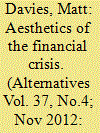

|
|
|
|
|
| Publication |
2012.
|
| Summary/Abstract |
The ways that financialization has contributed to the technocratic and antipolitical management of economies have become ever more evident in the wake of the financial crisis that commenced in the autumn of 2007. This bracketing and suspension of politics occurs in various ways but significantly, it does so through the obscuring of work as a moment of economic life. If economics has been complicit in this antipolitics, can an aesthetic approach to financialization shed light on how work is rendered invisible? This article analyzes four short film clips all distributed through YouTube to show not only how their visual and narrative elements organize subjectivities for an antipolitics of finance but also to find in the popular aesthetic a different "distribution of the sensible" that permits moments of suspension or rupture that can politicize financialized subjectivity and begin to recover a politics of work.
|
|
|
|
|
|
|
|
|
|
|
|
|
|
|
|
| 2 |
ID:
165696
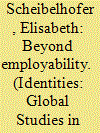

|
|
|
|
|
| Summary/Abstract |
The so-called “refugee crisis“ put forced migration to the core of Europe in a way not seen for years. Since then, a plethora of unsolved global issues which have effects on more privileged nation-states in the global North has once again came to the fore. This is especially true for the EU member states who may hardly be conceived as unitary in confronting the challenges forced migration implies for nation-states. The so-called ”receiving countries” have often set aside the humanitarian aspect of granting asylum. From their point of view, there is an increased economic interest in refugees with higher formal qualifications and work experience, who could be integrated comparatively easily into the national work forces without further investments. At the same time, such refugees would also serve national economic interests by strengthening qualified labor. Compared to earlier years of reception, several parts of Europe have thus encountered another period of numerous arriving and at least temporarily resident refugees.
|
|
|
|
|
|
|
|
|
|
|
|
|
|
|
|
| 3 |
ID:
160624
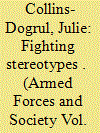

|
|
|
|
|
| Summary/Abstract |
This study examines reader responses to opinion editorials about women in combat and contributes to the literature on women in the military by explaining how contests over sex–gender essentialism and diversity underlie public debates about individual rights and military effectiveness. Comments in favor of women’s ground combat exclusion use a logic of averages to promote essentialist thinking about men and women. They categorize women as inferior soldiers and argue that desegregation puts individual soldiers and the nation at risk. Conversely, comments in favor of integration advance a view of sex–gender diversity that places men and women along a continuum with overlapping qualities, suggesting further that giving exceptional women the freedom to serve in ground combat will advance both equality and military readiness. We argue that public commentary about women in combat concerns more than the military, underlying this discourse are distinct conceptions and expectations of men and women.
|
|
|
|
|
|
|
|
|
|
|
|
|
|
|
|
| 4 |
ID:
182487
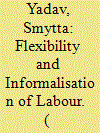

|
|
|
|
|
| Summary/Abstract |
In this article, I demonstrate, through the use of the life course perspective, how informal work in the form of verbal wage contracts might lead to dignity and autonomy amongst the rural poor. The article draws attention to a broader comparative context of how indigenous autonomies are produced. In that they have the relative freedom to engage in a range of informal work as discussed, the Gonds’ autonomy in a neoliberal sense consists of self-governance, which draws attention to the indigenous community’s conception of the self as an economic and autonomous entity that is sustained by a range of social networks.
|
|
|
|
|
|
|
|
|
|
|
|
|
|
|
|
| 5 |
ID:
171723


|
|
|
|
|
| Summary/Abstract |
In the postwar period, Japanese workers came to symbolize the economic and cultural prosperity of Japan. In return for their hard work, they were rewarded with life-time employment and various fringe benefits. This postwar social contract of "corporate welfarism" minimized the social risks and personal career uncertainties of a fluid labour market. However, nearly 30 years of economic recession and neo-liberal reforms have undermined the postwar model of corporate welfarism. Structural and management reforms have been invoked to reengineer Japan's corporate practices and to "flexibilize" the workforce, thereby "freeing" employees while offloading social risks of economic uncertainties to individual workers. As a result, these Japanese workers are caught between the slippage of the older corporate ideology of corporate welfarism premised on long-term employment, and the rise of the new global ideology of neo-liberalism premised on labour mobility, in the process exposing them to new social risks and conditions of uncertainty.
By focusing on mid-career and experienced workers whose expectations of long-term employment were directly affected by restructuring, this article sheds light on the various forms of "precarious employment mechanisms" that have been used to cut personnel costs while avoiding outright dismissal. Drawing from different cases of informants who have been subjected to various forms of restructuring, this article highlights the decoupling of Japan's welfare and employment systems and examines the mechanisms and experiences of "in-house unemployment" for employees in an increasingly hollowed-out corporate welfare society.
|
|
|
|
|
|
|
|
|
|
|
|
|
|
|
|
| 6 |
ID:
171134


|
|
|
|
|
| Summary/Abstract |
This article explores the articulation and experience of Soviet gendered ideology regarding work in the Tajik SSR, one of the Muslim Soviet peripheries, during the post-war period ending with Perestroika. Central Asian women’s work was used for economic purposes, as well as being a key driver for fulfilling the ideological objective of emancipating Central Asian women from religion and tradition. Through a feminist postcolonial geography approach, attentive to questions of discourse and material lived experiences, this article explores the ways in which gender and ethnicity were co-produced by Soviet ideology. Analysis of scientific publications produced by Tajikistani female researchers, and of women’s magazines from the 1950s, is contrasted with ethnographic data on workers from various collective farms and semi-urban places, including ‘work heroines’ (peshqadam). Our findings illustrate the hybrid nature of the Soviet regime, advancing theoretical debates on the use of postcolonial theory in Soviet Central Asia.
|
|
|
|
|
|
|
|
|
|
|
|
|
|
|
|
| 7 |
ID:
173997
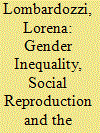

|
|
|
|
|
| Summary/Abstract |
Despite extensive attention being paid to the effects of the Universal Basic Income (UBI) on society at large, there has been little analysis on the relationship between gender inequality and UBI. The purpose of this article is first to reflect on the feminist arguments in favour of UBI and then to examine some of these points by also considering other available policies. By looking into the role of women’s work in both productive and reproductive activities, it is argued that UBI should not be disregarded as a social policy. However, its transformative capacity to empower women and to strengthen their role in society should not be overestimated. In order to address this gap, policy makers should address misconceptions around gender norms and acknowledge the multiple forms of women’s work across the social relations of production and reproduction.
|
|
|
|
|
|
|
|
|
|
|
|
|
|
|
|
| 8 |
ID:
108705
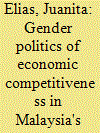

|
|
|
|
|
| Publication |
2011.
|
| Summary/Abstract |
Many academic commentators have pointed to how the widening and deepening of a neoliberal reform agenda in Southeast Asia has brought about the end of developmental forms of state governance and the emergence of less directly market interventionist states pursuing economic 'competitiveness'. In this paper, I note how notions of competitiveness are increasingly fused with ideas regarding the contribution of gender equity and women's empowerment to national economic success. However, drawing upon a case study of Malaysia, this paper highlights how government policies stressing both the marketisation of social reproduction and the need to expand women's productive roles are constantly brought into tension with embedded social structures. Such an emphasis is essential to any understanding of the role of the Malaysian state in economic development - a role that has been fundamentally shaped by a localised politics of ethnicity. The paper draws upon examples from government policy-making that conceptualise women as key workers in the emerging knowledge-driven economy and as microentrepreneurs driving pro-poor economic growth and illustrates how such policies are brought into tension with traditionalist discourses concerning the appropriate role of women in society.
|
|
|
|
|
|
|
|
|
|
|
|
|
|
|
|
| 9 |
ID:
084271


|
|
|
| 10 |
ID:
193606
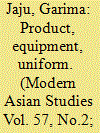

|
|
|
|
|
| Summary/Abstract |
The article focuses on how low and lower-middle class youth employed in new private sector jobs in the booming service economy in Indian cities engage with the material environment of their workplace, and how, through their ‘aesthetic scrutiny’ of its materiality, come to ‘consume’ work. The setting is the store floor of a fast-expanding organized retail company, called Spexy, that sells budget eyewear products. Through ethnographic elaboration, the article follows how the Spexy staff deride the ‘un-branded’ products, ‘un-technical’ equipment, and ‘un-professional’ uniforms at their workplace. The company, as constituted of these ‘poor’ materials, is mocked for failing in its ‘company-ness’ and branded ‘fake’. The material environment of the workplace provides a platform for the articulation of larger configurations of ‘feelings’ the youth seek to give and get through formal employment in a private company. These articulations, in turn, reveal larger sociocultural valuations regarding ideas of social mobility and visibility in contemporary India where there is a strong interest in brand regimes and brand value hierarchies, fixation with technological education and expertise, and attraction towards a corporate work culture in the private sector, and, concomitantly, a strong desire amongst the store staff to craft branded, technical, and professional work identities. By putting the scholarship on work and consumption in dialogue, the article demonstrates how bottom-rung urban workers look expectantly to the material environment of company work to fulfil these desires.
|
|
|
|
|
|
|
|
|
|
|
|
|
|
|
|
| 11 |
ID:
163585


|
|
|
|
|
| Summary/Abstract |
Rural employment generation was initiated in India through the National Rural Employment Guarantee Act (NREGA) in 2005 and related NREGS schemes, to provide better social and food security to socially and economically depressed rural workers. By now, the implementation of this scheme is known to be not equally satisfactory throughout India, with significant variations in different states and localities. This article, based on intensive fieldwork over 1 year in remote villages of Deogarh and Bhim blocks of Rajasamand district, explores the functioning of the scheme in rural Rajasthan. It identifies three important roadblocks to effective NREGA implementation and analyses their impact: persistence of caste-based inequalities and social interactions among different groups of rural people, differential occupational interests of potential workers and lack of initiative of the respective panchayats.
|
|
|
|
|
|
|
|
|
|
|
|
|
|
|
|
| 12 |
ID:
187290
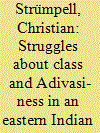

|
|
|
|
|
| Summary/Abstract |
In the eastern Indian steel town of Rourkela, Adivasis are widely stereotyped as uneducated, jangli (‘wild’), and drinkers, and they are therefore held to make for a special type of worker. Their Adivasi ‘nature’ makes them an ideal fit for facing the heat, dust, and fumes in the so-called ‘hot shops’ of the local public-sector steel plant. It is also said that Adivasis are, in fact, not well suited for the permanent and well-paid jobs the public-sector steel plant provides, and that they are better employed as contract workers who are paid little and by the day, and on whom the industry has increasingly relied since the 1970s. Critically engaging with Bourgois’ concept of ‘conjugated oppression’, I will show how these casteist stereotypes entrench the class position of Adivasis in the local steel industry, but also how this position has nevertheless changed over time—for some for the better, for many for the worse. Furthermore, although this polarization is driven by larger political economic changes it is exacerbated by the ways in which the better-off among the stereotyped Adivasi workers respond to them. This calls, I argue, for close attention to be given to the historical dynamics in the relations between class and caste (or ‘tribe’) and in the struggles related to them.
|
|
|
|
|
|
|
|
|
|
|
|
|
|
|
|
| 13 |
ID:
105502


|
|
|
| 14 |
ID:
110212
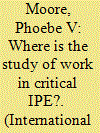

|
|
|
|
|
| Publication |
2012.
|
| Summary/Abstract |
The British school of International Political Economy (IPE) has been highly innovative in encouraging inter-disciplinary work, revealing - while allowing for - an eclecticism of research and investigation that stands in clear contrast to its American counterpart. Critical theorists in the British school of IPE in particular have been highly prolific in recent years and have introduced research on a wide range of contemporary issues in the global political economy. However, this school tends to overlook two very important areas of analysis: work and employment. More thus needs to be done. This article argues that researchers from seemingly autonomous fields can teach critical IPE a lesson: inter-disciplinarity is not a fantasy. The analysis suggested here is of how governmental policy idealises a particular subjectivity wherein workers are not employed, but are employable. Not only would a focus on this problem enhance existing research in critical IPE: it is also essential if we are to address the needs of humanity in the increasingly unstable and flexibilised world of work. The British school of critical IPE is the forum within which this conversation could and should be continued.
|
|
|
|
|
|
|
|
|
|
|
|
|
|
|
|
| 15 |
ID:
165701


|
|
|
|
|
| Summary/Abstract |
The contribution introduces the concept of ‘organised disintegration’. Based on an interview study conducted in Germany, the concept describes the life situation of asylum seekers and ‘tolerated’ refugees. At first, the theoretical references to the ‘total institution’ and ‘conduct of everyday life’ approaches are explained. ‘Work’ appears in the results as an arrangement of the refugees’ conduct of everyday life that is characterised by joblessness and futile search for employment. The refugees experience work as prohibited and their persistent situation as lost lifetime and as ‘human death’. At the same time, the arrangement of work is maintained as a meaningful part of ‘real life’ which begins immediately after overcoming the current legal status. The validity of the concepts that were made relevant as well as the implications for the current state of research in refugee studies are discussed in the conclusion.
|
|
|
|
|
|
|
|
|
|
|
|
|
|
|
|
| 16 |
ID:
159995
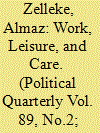

|
|
|
|
|
| Summary/Abstract |
In ‘The case for a participation income’, Anthony Atkinson identified unconditionality as an obstacle to support for a citizen's income. He advocated prioritising the universality and individuality of a citizen's income but replacing its unconditionality with a ‘participation’ requirement. At the time, Atkinson's critique read as political realism: to eliminate means‐testing, make a concession to the fear of free‐riding. Ironically, Atkinson remained opposed to unconditionality despite his own critical contributions to documenting the growing income and wealth inequality that have increased support for an unconditional basic income. In this article I consider the ‘participation’ requirement from a gender perspective in order to uncover the problematic notions of ‘dependence’, ‘independence’, reciprocity, and free‐riding that underlie normative arguments for conditional over unconditional benefits. Employing such a perspective demonstrates the superiority of unconditional benefits in achieving more efficient and effective income support and reducing inequality—Atkinson's core commitments throughout his distinguished career.
|
|
|
|
|
|
|
|
|
|
|
|
|
|
|
|
| 17 |
ID:
106551
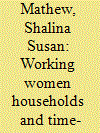

|
|
|
|
|
| Publication |
2011.
|
| Summary/Abstract |
This article explores the impact of labour force participation of Indian women on the consumption expenditure of their households. Field survey data were collected from working-wife and non-working wife households in Kerala, the state in India with the highest labour market participation of women in the organised sector. Differences in time-saving consumption expenditures of working and non-working wife households and different variables influencing consumption expenditures were researched. The study shows that among the variables which positively affect the time-saving consumption expenditure of the households, non-economic factors influence the time-saving consumption expenditure of the working-wife households more prominently than in non-working wife households.
|
|
|
|
|
|
|
|
|
|
|
|
|
|
|
|
|
|
|
|
|